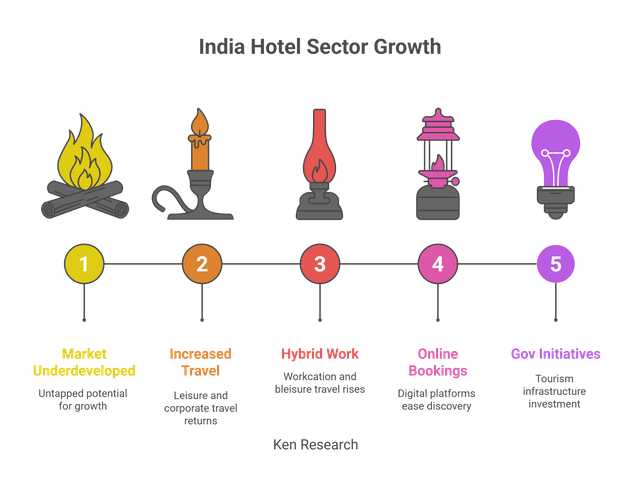India Hotel Market: Unlocking Growth Through Tourism, Business Travel, and Digital Booking
The India Hotel Market is experiencing an upward surge driven by rising domestic tourism, expanding international arrivals, and rapid digitization of the travel and hospitality industry. As consumer preferences shift toward experience-driven, flexible, and tech-enabled stays, hotel operators in India are modernizing their infrastructure, service models, and distribution channels.
From luxury resorts and heritage properties to budget hotels and business accommodations, the market is evolving quickly — backed by increasing disposable incomes, mobile-first behavior, and the proliferation of organized travel infrastructure.
Growth Drivers Accelerating the India Hotel Sector
Multiple macroeconomic and behavioral trends are fueling growth in the India Hotel Market size:
-
Return of leisure and corporate travel: After pandemic disruptions, travel confidence is back, with increased hotel occupancy across business hubs, pilgrimage sites, and weekend getaways.
-
Workcation and bleisure travel: Hybrid working models are driving bookings in hill stations, coastal cities, and eco-retreats for extended stays.
-
Rise of online hotel bookings: Platforms like Goibibo, MakeMyTrip, and Airbnb have digitized hotel discovery, comparison, and reservation processes.
-
Government initiatives: Schemes like Swadesh Darshan and PRASAD are investing in tourism infrastructure across heritage and spiritual circuits.
Together, these trends are pushing the Indian hospitality sector toward faster formalization, better service standardization, and stronger investment inflows.
Market Segmentation and Consumer Preferences
The market is segmented across:
-
Property type: Luxury, midscale, budget, resorts, business hotels, heritage stays
-
Location: Metro cities, Tier 2/3 towns, religious destinations, tourist circuits
-
Guests: Domestic leisure travelers, international tourists, business travelers, event/wedding groups
Consumers are now seeking hyper-personalized experiences — from curated culinary journeys to wellness packages — across all price brackets. This evolution mirrors changing expectations in the broader Global Hotel Market, where guest experience, sustainability, and personalization have become key performance metrics.
Competitive Landscape: Indian Chains and Global Influence
India’s hotel ecosystem comprises both domestic leaders and international chains:
-
Indian Hotels Company Ltd. (Taj), ITC Hotels, The Oberoi Group dominate the luxury space with service excellence and legacy appeal.
-
Lemon Tree, Sarovar, Ginger target mid-market corporate and leisure segments.
-
Budget and smart hotel chains such as OYO, Treebo, and FabHotels offer tech-first, affordable stays targeting younger consumers and business travelers.
Indian brands are increasingly aligning their offerings with Global Hotel Market trends, including contactless check-ins, loyalty ecosystems, mobile key access, and data-driven personalization.
Challenges to Address
Despite the strong tailwinds, several challenges persist:
-
Unorganized supply in Tier 2/3 cities lacking standardized service protocols
-
Seasonal volatility, especially in tourist-heavy destinations
-
Skill shortages in housekeeping, F&B, and concierge roles
-
CapEx pressures for new hotel development due to regulatory hurdles
Solving these gaps will require joint action from public and private stakeholders, especially in areas like tourism training, infrastructure development, and affordable finance for small hotel operators.
Future Outlook: Personalized Hospitality and Sustainable Growth
The future of the India Hotel Market will be shaped by several emerging dynamics:
-
Growth in wellness tourism with Ayurveda retreats and yoga resorts gaining popularity.
-
Green-certified hotels and sustainable operations as eco-conscious travel becomes mainstream.
-
Demand for long-stay formats and co-living hotels catering to digital nomads and professionals.
-
Strong expansion in underserved cities and spiritual centers due to growing internal tourism.
As the hospitality sector scales up to meet these expectations, India is also aligning itself with the modernization seen across the Global Hotel Industry, where the focus is on building smart, sustainable, and service-oriented hotel ecosystems.
If you’d like to explore more of my trending blogs, this reflects the evolving dynamics and transformations currently shaping the market.
Conclusion
The India Hotel Market stands at a defining moment. Fueled by digital disruption, rising income levels, and lifestyle shifts, it is evolving into a more organized, tech-enabled, and guest-centric industry.
By tapping into lessons from the Global Hotel Market, Indian hotel chains can elevate their competitiveness while also delivering uniquely local experiences. For investors, developers, and operators, this is the time to reimagine hospitality — not just as accommodation, but as a platform for comfort, culture, and connection.
